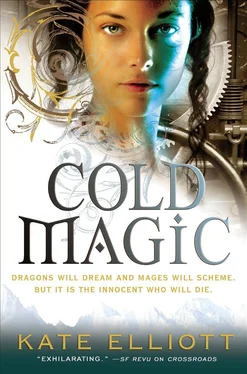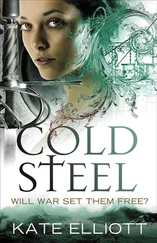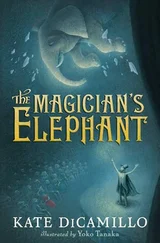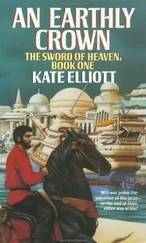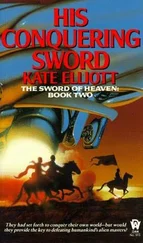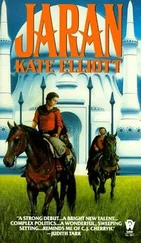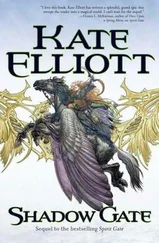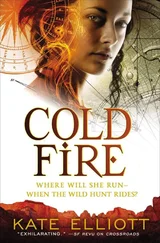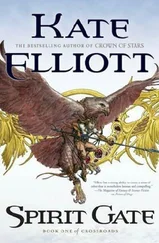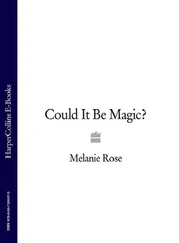Kate Elliott - Cold Magic
Здесь есть возможность читать онлайн «Kate Elliott - Cold Magic» весь текст электронной книги совершенно бесплатно (целиком полную версию без сокращений). В некоторых случаях можно слушать аудио, скачать через торрент в формате fb2 и присутствует краткое содержание. Жанр: Фэнтези, на английском языке. Описание произведения, (предисловие) а так же отзывы посетителей доступны на портале библиотеки ЛибКат.
- Название:Cold Magic
- Автор:
- Жанр:
- Год:неизвестен
- ISBN:нет данных
- Рейтинг книги:4 / 5. Голосов: 1
-
Избранное:Добавить в избранное
- Отзывы:
-
Ваша оценка:
- 80
- 1
- 2
- 3
- 4
- 5
Cold Magic: краткое содержание, описание и аннотация
Предлагаем к чтению аннотацию, описание, краткое содержание или предисловие (зависит от того, что написал сам автор книги «Cold Magic»). Если вы не нашли необходимую информацию о книге — напишите в комментариях, мы постараемся отыскать её.
Cold Magic — читать онлайн бесплатно полную книгу (весь текст) целиком
Ниже представлен текст книги, разбитый по страницам. Система сохранения места последней прочитанной страницы, позволяет с удобством читать онлайн бесплатно книгу «Cold Magic», без необходимости каждый раз заново искать на чём Вы остановились. Поставьте закладку, и сможете в любой момент перейти на страницу, на которой закончили чтение.
Интервал:
Закладка:
The man I had to call my husband sat opposite me, arms crossed as he stared out the window. He seemed to be looking inward, mulling deep thoughts like spiced wine. He was still smudged and stained from his night's adventures: a torn sleeve, a streak like mud on his left cheek, a chaff of straw caught in his carefully trimmed beard. He had a proud face more Afric than Celtic and very handsome eyes, of the kind Bee loved to swoon over, so brown they were almost black, thickly lashed and finely
formed. He had boasted of destroying an airship. He had been glad to do it, no matter its cost to others in material and labor. Perhaps in lives.
He shifted forward, and I averted my gaze hastily, but he wasn't interested in me. The road was beginning to rise into the chalk hills. Somewhere up here stood the famous windmill, but because it lay on the western side of the road and my shutter remained closed, I had no chance to see it. We drove into a wood of black pine, and soon I saw nothing but pine beyond the ditches that flanked the raised roadbed.
He grabbed his own cane-polished ebony inlaid with gold-and, thrusting it out the open window, rapped the side of the carriage.
"The beacon!" he called.
The coachman cracked his whip, and horses and coach swerved off the road. I braced myself for a jolting fall, but rather than crashing down into a ditch, we rolled along two dirt strips with grass grown between that cut through the pinewoods. The air grew abruptly colder. Under the dark thatch of branches, the rain ceased prattling on the roof. We scraped along dry ground that hadn't seen rain this day and shortly afterward jerked to a halt.
He opened the door without waiting for the footman, leaped out, and strode away. I sat shivering. When nothing happened except for the horses stamping and slobbering, I slid along the seat to the door and jumped to the ground. The dense pine-woods lay behind and somewhat below us. I gazed onto a landscape empty of human presence, a rolling, open countryside of smooth-shouldered hills and a single high beacon of a hill- Brigands' Beacon, most likely-rising where a pale chalk track wound up its grassy slope. He was walking up the slope toward the crest of the hill.
The carriage rested near a fire circle, a neat ring of stones
within which lay the charred remains of branches and, beside it, a small byre sheltering stacked firewood. The coachman walked among the team, offering the bucket to each beast in turn, and although the liquid was clear as water and sloshed in a waterlike manner, I could not help but think there was something strange about the way the cloudy light glinted in the drops that spattered from the horses' muzzles after they'd had their drink.
I had to walk, because I was so very cold, and as I paced, I watched my husband vanish over the hill's horizon. It was as if the sky had swallowed him. Not an unpleasant thought, now that I reflected on it. Yet what would become of me then? How far did our chained marriage actually bind me?
The coachman finished rubbing down the horses and went to the circle, stacking wood and kindling and, with flint and steel, sparked a fire. The flames caught. The wood burned.
No cold mage, he! Nor creature of the breathing ice, like the eru. Fire did not come to their hands, and their presence killed it.
I crept close to the blessed warmth. "Heat is a glorious thing, is it not?" I said. "When winters run long and cold, as winters do, a fire is the best thing of all."
"Maestra," he said, unsmiling but not unfriendly.
He wore his short hair in the lime-whitened spikes traditional to Celtic warriors in ancient days, according to the records of Kena'ani traders and Roman generals. The style had come back into fashion a generation ago among the soldiers fighting for Camjiata and his Arverni-Iberian army during Camjiata's attempt to unite-or, as others said, conquer-Europa. In recent years, the fashion had spread throughout the north among laborers and the poor, even into the territories of the western Celts who had fought hardest to halt the Iberian Monster's advance. After all, now that the threat of war was past, humble laborers who toiled for harsh masters mighl recall that
Camjiata's revolutionary legal code had offered hope for a measure of emancipation.
After a moment, the coachman walked back to our vehicle and dug into a storage space under the driver's box. Seen from this angle, in the pearlescent light of a cloudy day, the damage the carriage had taken in the night showed vividly: The box was scarred with pits and gouges and was spittled with mud and debris flung by angry hands. Just who the mob hated most I could not be sure: the princely clans that had ruled and feuded, and feuded and ruled, in the eight hundred years since the collapse of the Roman Empire, or the powerful mage Houses that had brought down the Iberian Monster and exiled him to an island prison thirteen years ago.
The coachman walked back to me with a heavy wool coat draped over one arm. "You might wish for this, maestra," he said, offering it politely. "He'll not like its look, but it'll keep you warm."
If the coachman had not already been wearing an outdoor coat, I'd not have accepted it, but he was, so I did, and spoke grateful thanks as I pulled it on over my riding clothes and buttoned it up to my chin.
He stripped the gloves off his own hands. "These, too, maestra. Your hands look like they're turning to ice."
"I can't take those!"
He paused in the act of offering, and I knew the shame of having insulted another person who was trying to give me a gift.
"I meant, I can't take the gloves off your hands when you're out of doors driving. Thanks to your kindness, I at least can now curl my hands up inside these sleeves."
He wasn't a smiler, but the skin around his eyes wrinkled. "Best you do take them, maestra. The weather's turning. I'm accustomed to the cold."
I had to take them or compound the insult. The gloves fit tolerably well. At first my fingers smarted, and then they tingled, and then I began to feel my digits might survive the journey intact.
"You might want to stretch your legs," he added. "We'll not reach the next inn until nightfall."
"Won't you need to change horses?"
He glanced their way. "They'll endure."
Because maybe they weren't mortal horses, but I didn't say that aloud. "Why did we stop here at all, if it's so far to the next inn:
He looked toward the hilltop. "The magister must pay his respects."
"Pay his respects to, ah, what?"
"His ancestors." With a lift of his square chin, he indicated the fire. "I'll brew tea."
"I'll walk, then."
He was a man who could stand uncannily still and yet seem to be aware of everything around him. His gaze caught mine. He had the blue eyes known in the north as the mark of the ice. "I am obliged to inform you that a powerful spirit inhabits the hilltop."
I looked at him and he looked at me. It was then I realized I had not seen the footman since I had emerged from the carriage.
"Who are you?" I asked.
His expression did not change. "I am a coachman." With a nod, he turned away to his work.
We must be what we are. And right now, I was intensely curious. 1 strode up the chalk track, whacking at stalks of grass with my cane. The view from the top was astonishing. The crisp autumn air made the sprawl of hills seem as sharply delineated as the tips of cold-whitened grass brushing at my skins. On the
lowland plain to the south rose a faintly seen tower, likely New-field's famous Round Tower, beyond which the lowland plain fell steadily away toward the marshy Sieve. Just ahead, a steep escarpment marked the east-west line of the chalk ridge; far to the north, many miles onward, rose another high beacon hill. The line of the road speared between my feet and that distant landmark. Only where the pinewoods spread dense below me did a mist climbing through the branches obscure the view.
Читать дальшеИнтервал:
Закладка:
Похожие книги на «Cold Magic»
Представляем Вашему вниманию похожие книги на «Cold Magic» списком для выбора. Мы отобрали схожую по названию и смыслу литературу в надежде предоставить читателям больше вариантов отыскать новые, интересные, ещё непрочитанные произведения.
Обсуждение, отзывы о книге «Cold Magic» и просто собственные мнения читателей. Оставьте ваши комментарии, напишите, что Вы думаете о произведении, его смысле или главных героях. Укажите что конкретно понравилось, а что нет, и почему Вы так считаете.
